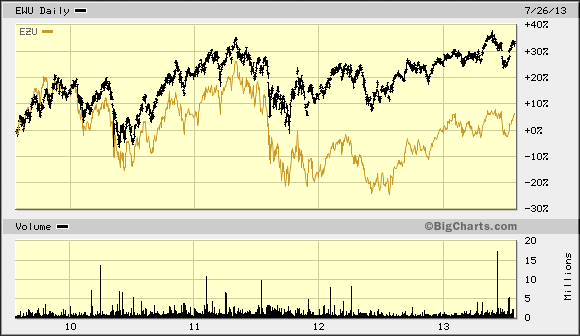most recent cover story exclaimed, “Europe Will Bounce Back.” Believers argue that euro-zone factory output increased for the first time in well over year. Meanwhile, the European Commission’s economic morale index rose to its highest since May of 2012. What’s more, Spain’s unemployment rate actually fell for the first time in two years. Who would have believed that?
Do the modest signs of improvement warrant a stock allocation to one or more of the 17-member countries in the European Monetary Union? Momentum indicators suggest that you should consider it. However, I am not intrigued by a recent boom in equities tied to the monetary union nor the “improving” data. For example, Spain’s unexpected drop in unemployment is entirely seasonal, tied to the wave of tourism that occurs at this time of year. Moreover, the potential for a sovereign bond flare-up in Italy, Portugal, Greece or Spain is still exceedingly high; the unworkable debt burdens that each faces continue to move higher into the realm of the absurd. (Note: Each of these countries will end 2013 in a debt-to-GDP range of 125%-175%.)
On the other hand, iShares MSCI United Kingdom (EWU) may be a developed European investment worthy of consideration.
Here are three reasons why a moderate dollar amount may provide reasonable reward for the risk:
1. They’re A Whole Lot Like Us. For the first time since 2011, the United Kingdom can boast (and I use the word “boast” squeamishly) back-to-back quarterly increases in its economic output; GDP rose 0.6% in the 2nd quarter after rising a mere 0.3% in Q1. Give credit to the UK consumer. Annual disposable income may be increasing in a country where the consumer accounts for nearly two-thirds of the economy. Housing is also gathering strength, as mortgage approvals recently logged a 17-month high. In other words, ultra-low interest rate policy coupled with central bank bond purchasing has boosted borrowing in a consumption-based society. And we have all come to realize just how much an equity market loves the stimulus game.
2. Fundamentally Speaking, U.K Stocks May Be More Attractive Than U.S. Stocks. According to Morningstar, iShares MSCI United Kingdom (EWU) trades at 12.4 times forward earnings with an annualized dividend yield of 3%. That makes EWU roughly 16% less expensive than the S&P 500, though EWU offers a 100 basis points of additional annual cash flow. EWU has plenty of comparable big-name multinationals as well, including GlaxoSmithKline, Brittish American Tobacco, Diageo and Vodafone. Others may find value in the 20% consumer staples weighting since it is greater than the S&P 500.
3. The United Kingdom Is Not A Member of the Euro-Zone. It is true that funds like iShares MSCI United Kingdom (EWU) cannot entirely escape the drag of a 17-member monetary bloc in its backyard. On the other hand, the UK is free to act in its own best interest whereas the monetary union is strapped with scores of debt-laden recessionary economies in need of constant bailouts. Moreover, the correlation between EWU and the iShares European Monetary Union (EZU) is not particularly strong at .68. In other words, if you’re genuinely intrigued by the idea of adding a foreign developed stock asset to your portfolio, selecting a large individual economy that resembles the United States should result in less baggage and better risk-reward potential.
You can listen to the ETF Expert Radio Show “LIVE”, via podcast or on your iPod. You can follow me on Twitter @ETFExpert.
Disclosure Statement: ETF Expert is a web log (”blog”) that makes the world of ETFs easier to understand. Gary Gordon, MS, CFP is the president of Pacific Park Financial, Inc., a Registered Investment Adviser with the SEC. Gary Gordon, Pacific Park Financial, Inc., and/or its clients may hold positions in the ETFs, mutual funds, and/or any investment asset mentioned above. The commentary does not constitute individualized investment advice. The opinions offered herein are not personalized recommendations to buy, sell or hold securities. At times, issuers of exchange-traded products compensate Pacific Park Financial, Inc. or its subsidiaries for advertising at the ETF Expert web site. ETF Expert content is created independently of any advertising relationships.
- English (UK)
- English (India)
- English (Canada)
- English (Australia)
- English (South Africa)
- English (Philippines)
- English (Nigeria)
- Deutsch
- Español (España)
- Español (México)
- Français
- Italiano
- Nederlands
- Português (Portugal)
- Polski
- Português (Brasil)
- Русский
- Türkçe
- العربية
- Ελληνικά
- Svenska
- Suomi
- עברית
- 日本語
- 한국어
- 简体中文
- 繁體中文
- Bahasa Indonesia
- Bahasa Melayu
- ไทย
- Tiếng Việt
- हिंदी
How Much -- If Any -- EU Equity Should You Hold?
Published 07/26/2013, 02:28 PM
Updated 07/09/2023, 06:31 AM
How Much -- If Any -- EU Equity Should You Hold?
Barron’s
Latest comments
Loading next article…
Install Our App
Risk Disclosure: Trading in financial instruments and/or cryptocurrencies involves high risks including the risk of losing some, or all, of your investment amount, and may not be suitable for all investors. Prices of cryptocurrencies are extremely volatile and may be affected by external factors such as financial, regulatory or political events. Trading on margin increases the financial risks.
Before deciding to trade in financial instrument or cryptocurrencies you should be fully informed of the risks and costs associated with trading the financial markets, carefully consider your investment objectives, level of experience, and risk appetite, and seek professional advice where needed.
Fusion Media would like to remind you that the data contained in this website is not necessarily real-time nor accurate. The data and prices on the website are not necessarily provided by any market or exchange, but may be provided by market makers, and so prices may not be accurate and may differ from the actual price at any given market, meaning prices are indicative and not appropriate for trading purposes. Fusion Media and any provider of the data contained in this website will not accept liability for any loss or damage as a result of your trading, or your reliance on the information contained within this website.
It is prohibited to use, store, reproduce, display, modify, transmit or distribute the data contained in this website without the explicit prior written permission of Fusion Media and/or the data provider. All intellectual property rights are reserved by the providers and/or the exchange providing the data contained in this website.
Fusion Media may be compensated by the advertisers that appear on the website, based on your interaction with the advertisements or advertisers.
Before deciding to trade in financial instrument or cryptocurrencies you should be fully informed of the risks and costs associated with trading the financial markets, carefully consider your investment objectives, level of experience, and risk appetite, and seek professional advice where needed.
Fusion Media would like to remind you that the data contained in this website is not necessarily real-time nor accurate. The data and prices on the website are not necessarily provided by any market or exchange, but may be provided by market makers, and so prices may not be accurate and may differ from the actual price at any given market, meaning prices are indicative and not appropriate for trading purposes. Fusion Media and any provider of the data contained in this website will not accept liability for any loss or damage as a result of your trading, or your reliance on the information contained within this website.
It is prohibited to use, store, reproduce, display, modify, transmit or distribute the data contained in this website without the explicit prior written permission of Fusion Media and/or the data provider. All intellectual property rights are reserved by the providers and/or the exchange providing the data contained in this website.
Fusion Media may be compensated by the advertisers that appear on the website, based on your interaction with the advertisements or advertisers.
© 2007-2024 - Fusion Media Limited. All Rights Reserved.
